Happy Monday! After a frenetic weekend of news in the aftermath of Thursday night’s presidential debate, perhaps we all need to take Rep. Jim Clyburn’s advice and “chill out.”
Up to Speed
- Former Trump adviser Steve Bannon reported to prison today after the Supreme Court rejected his appeal to delay his four-month sentence on Friday. A Washington, D.C., jury found Bannon guilty in July 2022 on two counts of contempt of Congress for refusing to comply with a House January 6 select committee subpoena. Bannon has remained unapologetic, claiming that executive privilege protected the testimony and information the committee sought, an argument courts have rejected. Bannon is the second Trump ally to serve a four-month prison term on similar charges after trade adviser Peter Navarro reported this March to a Miami prison where he now resides.
- On NBC’s Meet the Press, potential Trump running mate Gov. Doug Burgum of North Dakota renounced a statement he made in 2016 that “America was an unsafe place for women before Roe v. Wade.” He told the network’s Kristen Welker: “Let’s be clear. That was a comment from over eight years ago, and, certainly, I’ve evolved on that position. But part of it I’ve evolved is that I understand that it’s important that what North Dakota, as a very pro-life state—different than even our neighbor, Minnesota—the states are going to be different. And I have been clear that I am opposed to a federal abortion ban. I’m aligned with President Trump on that.” Many Republicans have sprinted to align their views with Trump on the issue since the former president said he believed abortion policy is best left to the states.
- The National Republican Congressional Committee’s independent expenditure team will spend $45.7 million in TV and digital advertising to grow the GOP’s House majority this fall, about $17 million more than its Democratic counterpart. The campaign arm will spend a quarter of that money targeting five Democratic incumbents whose districts former President Donald Trump won in 2020—Reps. Mary Peltola of Alaska, Jared Golden of Maine, Marcy Kaptur of Ohio, Matt Cartwright of Pennsylvania, and Marie Gluesenkamp Perez of Washington. Its spending plan also indicates that it will reserve ad buys to defend vulnerable Republicans such as Rep. Lori-Chavez-DeRemer of Oregon, Don Bacon of Nebraska, and multiple congressmen in New York and California.
- Pennsylvania Sen. Bob Casey’s reelection campaign distanced itself from a left-wing super PAC’s ad that discouraged Pennsylvanians from voting by mail, National Review reported Saturday. “Senator Casey and his campaign encourage Pennsylvanians to use whatever method of voting is most convenient for them, including voting by mail,” Casey campaign spokeswoman Maddy McDaniel told the outlet. “We reject efforts of any kind to undermine confidence in mail-in voting.” Casey’s campaign did not authorize PA Values’ ad—which told “MAGA Patriots” to “listen to our president” and stand with him “against mail-in voting”—but he took heat for it because the super PAC spent against Casey’s Republican opponent, Lou Barleta, in 2018.
- Republican Dave McCormick, who is challenging Casey this year, cut an ad Sunday bashing the incumbent senator following President Joe Biden’s poor debate performance. The ad features reactions from commentators remarking on the president’s performance followed by clips of Casey expressing his confidence in Biden’s ability to do the job of the chief executive. “When will Casey finally tell the truth?” reads the text that appears on screen at the end of the ad.
Biden Scrambles to Save Bid Amid Resistance from Democrats
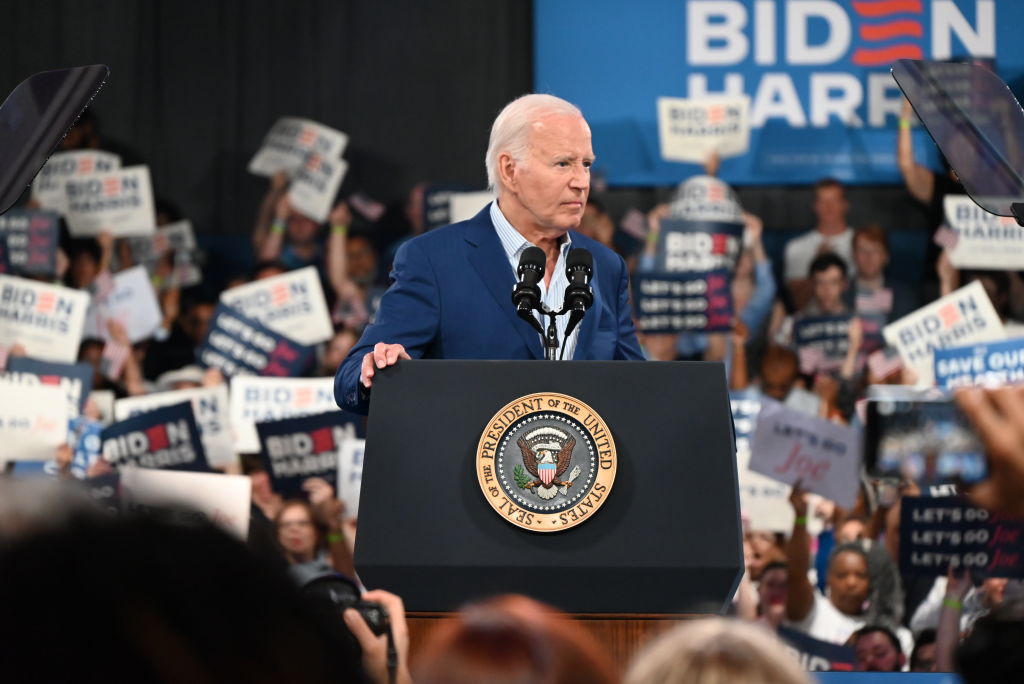
The battle over Joe Biden’s future was still raging Monday, with the 81-year-old president and his campaign insisting he would recover from last week’s debate debacle while the drumbeat for change from prominent Democrats, donors, and other supporters grew louder.
During a campaign rally Friday in Raleigh, North Carolina, and at a trio of subsequent high-dollar fundraisers that stretched into Saturday Biden conceded age has hobbled his mental and physical capabilities but maintained he was nonetheless equipped for a second term. It was a remarkable concession and revealed the extent of the president’s political predicament—both inside the Democratic Party and in his rematch with presumptive Republican nominee Donald Trump.
“I understand the concern after the debate. I get it. I didn’t have a great night. But I’m going to be fighting harder,” Biden said, according to a White House transcript, during remarks to attendees of the fundraiser in Red Bank, New Jersey, that included New Jersey Gov. Phil Murphy. “I would not be running again if I didn’t think I had the heart and soul to get this job done.”
However—and here is the key line: “I know I don’t walk as quickly as I used to,” the president added. “I don’t speak as smoothly as I used to. I don’t debate as well as [I] did … in the past.” Those comments amount to a stark reversal from the dismissive attitude Biden and his campaign had previously displayed whenever confronted with the fact that a majority of voters do not believe he can handle the rigors of the presidency for another four years.
Meanwhile, the architect of Biden’s 2020 victory over Trump, top adviser Jen O’Malley Dillon, issued a campaign memorandum arguing Thursday’s primetime debate had not materially altered the contours of the race. “If we do see changes in polling in the coming weeks, it will not be the first time that overblown media narratives have driven temporary dips in the polls,” she wrote in the memo. (The problem for Biden with an unchanged race? Trump has been leading, nationally and in crucial battleground states, since last fall.)
Attempts at damage control are going about as well as Biden’s debate performance, even as prominent Democrats, among them former presidents Bill Clinton and Barack Obama, publicly rally to the president’s side.
After seeing Biden up close and personal at the fundraiser in East Hampton, New York, supporter and donor Anthony Scaramucci—the former Trump booster and short-lived Trump White House communications director—was not impressed. “I thought he did quite well reading the teleprompter today and meeting with people. However, that is not going to be enough to prove to the American people that he’s up for another 4 years,” the wealthy Wall Street financier posted on X.
Recent conversations between the Biden campaign and Democratic donors and influential Democratic politicians, as well as between the Democratic National Committee and its rank-and-file members, exposed severe rifts with the president and his campaign team. It points to a near-complete lack of faith in his prospects for bouncing back from his bad debate and defeating Trump on November 5.
For instance, Politico’s Jonathan Martin reported that Michigan Gov. Gretchen Whitmer “phoned O’Malley Dillon with more of an unambiguous SOS: to relay that Michigan, in the wake of the debate, was no longer winnable for Biden.” Whitmer, a Democrat serving in her second term as governor, is often mentioned as a possible Biden replacement for the 2024 nomination should the president step aside.
In an ABC News report, some DNC members accused Democratic Party Chairman Jaime Harrison and Biden campaign manager Julie Chavez Rodriguez of lying about the political fallout from the debate and dismissing concerns about the president’s viability. “I was hoping for more of a substantive conversation instead of, ‘Hey, let’s go out there and just be cheerleaders,’ without actually addressing a very serious issue that unfolded on American television for millions of people to see,” Joe Salazar, an elected DNC member from Colorado, said.
“But we didn’t get that. We were being gaslit,” he added.
Wealthy Democratic donors also are upset and wavering, Variety reports. “With all the text chains I’m on, people are basically like, ‘If he doesn’t drop out, we’re not giving any more money to Democrats or the Democratic Party,’” an entertainment industry donor told the Hollywood trade publication.
That’s a dangerous potential problem for Biden, should it materialize. He needs a continued influx of funds from wealthy contributors to finance sprawling voter turnout and data operations that are among the few advantages he maintains over Trump.
And if all that isn’t enough pressure, the rightmost part of Biden’s coalition—the Never Trump ex-Republicans supporting the president—have been vocal in urging him to reconsider running for reelection. As Dispatch Politics first reported Sunday, a group of these operatives and commentators was planning to meet Monday morning with the Biden campaign in Washington.
Replacing Biden Might Solve One Problem But Create Others
What if President Joe Biden did step aside at the eleventh hour? Aside from the resulting political earthquake and uncertainty, the Democratic Party would face myriad financial, legal, and logistical challenges to getting its new ticket off the ground.
From a fundraising perspective, Vice President Kamala Harris as Biden’s replacement makes the most sense, even if her approval ratings are underwater at 39.4 percent. As the president’s current running mate, she has a legal claim to Biden’s war chest, worth $91.6 million as of June 1. Some Republican election lawyers contend that even this is a gray area of federal law, as the money was raised by Biden, not Harris.
But the vice president is the party’s best bet for ensuring a seamless financial and operational transition.
Should the Democrats jettison the party’s 2024 ticket entirely, Biden would have to transfer his campaign money to either the Democratic National Committee or a super PAC. Neither would be able to coordinate fully with the new nominees for president and vice president, although the DNC would be able to work directly with the new campaign to some degree and new Federal Election Commission regulations permit collaboration for door-to-door canvassing.
Logistically, the upcoming Democratic convention in Chicago, scheduled for August 19-22, provides an existing mechanism for nominating a new ticket. Even now, Biden and Harris are technically presumptive nominees.
But time is short. The convention is just seven weeks away (less than that by the time Biden might drop out). While it would be welcomed by many Democrats, the president’s exit would temporarily throw the party into chaos. Once a new ticket is installed, it would have possibly less than three months to make its case to voters—less than that when the start of early voting is taken into account. And that assumes that other hurdles, like ballot deadlines in key states and Republican legal challenges, can be surmounted.
For instance, in Pennsylvania, a critical state for Democrats versus Trump, the last day to withdraw a candidate nominated in the primary is in mid-August, before the Chicago convention. Incumbent presidents typically schedule late summer conventions to maximize the potential for a polling bounce that coincides with Labor Day. But in this case, that plan could force Democrats to hold a snap nomination gathering sooner than might be possible to avoid missing ballot deadlines, unless they want to take their chances in court.
With Biden possibly waiting for a couple of weeks of polling to decide how far his 2024 prospects have fallen post-debate, Democrats may have no other choice.
Notable and Quotable
“Yeah, girl, I’m out here in these streets, and let me tell you, you’re right, Taraji. There is so much at stake in this moment. The majority of us believe in freedom and equality, but these extremists—as they say, ‘They not like us.’”
—Vice President Kamala Harris in a bit with actress Taraji P. Henson for Sunday night’s BET Awards, June 30, 2024



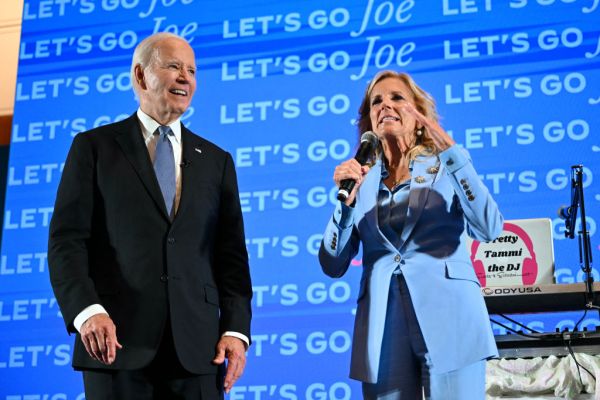
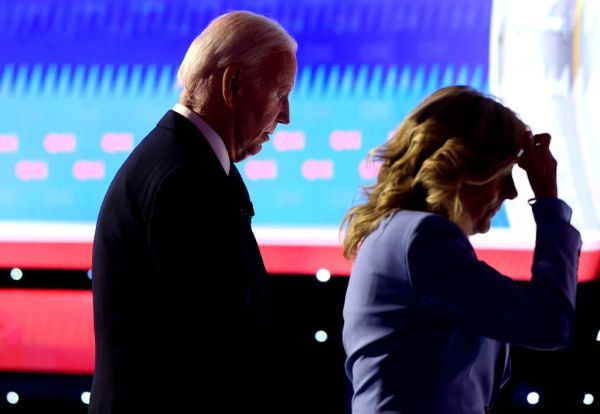
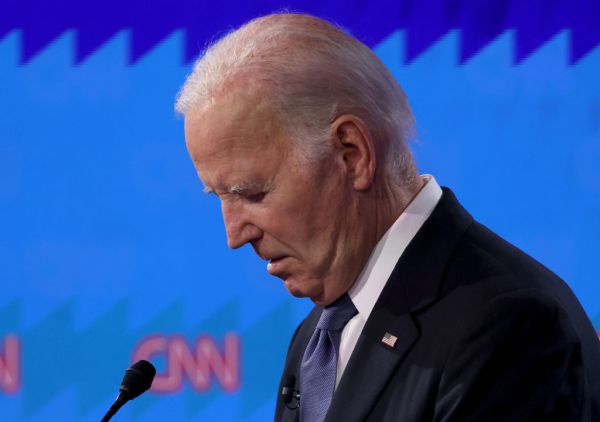

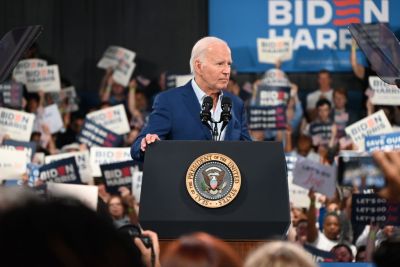
Please note that we at The Dispatch hold ourselves, our work, and our commenters to a higher standard than other places on the internet. We welcome comments that foster genuine debate or discussion—including comments critical of us or our work—but responses that include ad hominem attacks on fellow Dispatch members or are intended to stoke fear and anger may be moderated.
With your membership, you only have the ability to comment on The Morning Dispatch articles. Consider upgrading to join the conversation everywhere.